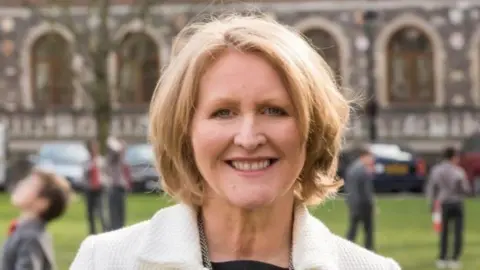Postcode lottery for speech therapy, says commissioner
 Getty Images
Getty ImagesChildren in England face a postcode lottery when it comes to getting speech and language therapy, a report claims.
England's Children's Commissioner says that in the top 25% of areas, at least £291.65 a year is spent on children with these needs. In the lowest quarter that drops to £30.94 or less.
Anne Longfield says the needs of children with speech, language and communication issues are overlooked.
The government said it was working to improve support for children in need.
Department for Education figures suggest that in 2018, there were 193,971 children in England's primary schools on the special educational needs register because of speech, language and communication needs.
But Ms Longfield says there is "enormous variation" in spending on services across the country.
Her report says difficulties can have "severe long-term effects on their [children's] education, their emotional well-being and their employment prospects".
The commissioner's researchers gathered data from local authorities and clinical commissioning groups (CCGs) - in total, 144 out of 152 authorities and 181 out of 195 CCGs responded.
The report does not give a regional breakdown of how much is spent per child with an identified need.
However, across all children, spending in London appears to be most generous at £7.29, and the East Midlands is the least generous at 34p.
The North of England has the highest CCG spend per child with needs at £17.61, and the lowest is in the Midlands and East NHS region at £10.20.
The report also raises concerns about falls in spending in various parts of the country, saying: "While overall spending has increased (albeit by only 2% per child), it has fallen in many areas.
"More than half of areas experienced a real-terms decline in spending per child."
 Office of the Children's Commissioner
Office of the Children's Commissioner Ms Longfield said: "In this report, I found that there is enormous variation in spending around the country on speech and language services, just as there is on lower level mental health services.
"I am concerned that this means a postcode lottery for children who need this vital help. I am also worried that it is these kinds of non-statutory services - which can help to prevent other issues emerging further down the line - which are most at risk as budgets face increasing pressures.
"We need to be able to monitor the spending on these services, in order to hold local areas to account for the funding decisions they take, as well as hold national government to account for the constrained circumstances in which those decisions are taken."
Kamini Gadhok, chief executive of the Royal College of Speech and Language Therapists, said the current situation was "unacceptable", adding that its own survey had shown that 59% of parents have to fight to get the support their child needs.
A spokeswoman for the Department of Health said: "Speech and language therapy gives children in need the best start in life
"As part of the NHS Long Term Plan, we are working to improve support for children and young people, including considering how to ensure we have the right numbers of speech and language therapists to meet demand.
"Good early years education is the cornerstone of social mobility.
"We are boosting local early years services with £8.5m to help establish best practice and are providing £50m to develop more high-quality school-based nursery provision for disadvantaged children, £26m to set up a network of English hubs and a national training centre, and £20m on the professional development of early years practitioners - ensuring every child can thrive."
